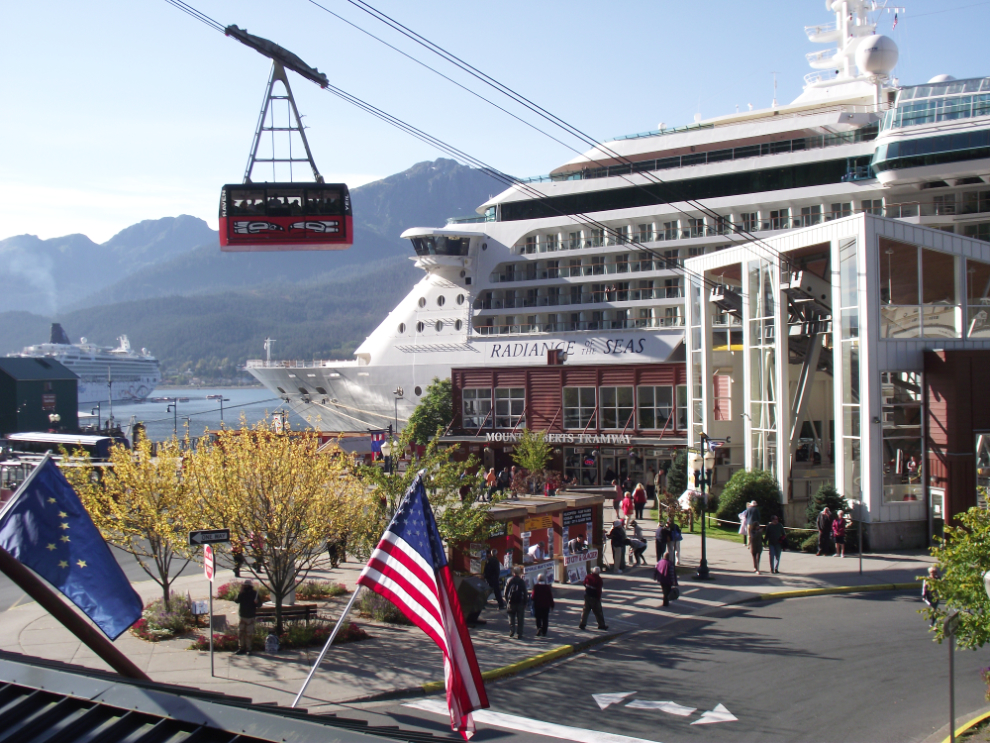Alaska cruise ship shopping promoters fined for deceptive practises
A significant piece of legislation regarding the cruise ships which visit Alaska every summer was passed virtually unnoticed by the State of Alaska on February 4, 2013.
Shopping is an activity that is very much encouraged by cruise lines. There are shopping malls on all large cruise ships, and shops in the ports visited get the opportunity to be promoted on board the ships, for fees that range from a flat fee to a commission on sales. For that fee, shops are included in talks that take place the day before arriving at each port, and are included in the multi-page “port guide” that’s handed to each passenger as they disembark in each port. The port guides typically included a map showing the location of each shop, and ads of various types for shops which have paid higher fees.
While online discussions about port shopping are always dominated by people who claim not to shop, the reality is that the shopping talks on the ships often attract 1,000 people or more to the theatre, while talks by the ship naturalist or other speakers are lucky to attract 1/3 that many. The various fees and commissions from shopping are one of the reasons that cruises are as inexpensive as they are today.
Three Florida-based promotion companies, who themselves pay to operate on the ships, conduct most of the port shopping programs for all the cruise lines – Onboard Media Inc. (OBM), Royal Media Promotions, Inc. (RMP), and Panoff Publishing Company (PPI). Under Alaska’s Unfair and Deceptive Trade Practices and Consumer Protection Act, each has been assessed a penalty which has to be paid to the State of Alaska: OBM agreed to pay $75,000; RMP agreed to pay $45,000; and three divisions of PPI agreed to pay a total of $90,000.
Among other terms in the settlement, the companies must not:
- allow Port Lecturers to represent that they will assist passengers in negotiating the best prices or getting “deals” with participating merchants while failing to disclose that the companies and their speakers receive promotional fees and commissions from those shops based on passenger sales;
- representing that a cruise line or promotion company has selected, recommended, or approved a merchant when in fact retailers pay to be in the program;
- represent or imply that passengers will pay “duty-free” prices, that passengers do not have to pay sales taxes at ports in Alaska, or make other similar false representations regarding prices;
- disparage businesses that do not participate in the shopping program, or disparage merchandise purchased by consumers from non-participating merchants.
- state or suggest that it is risky or unsafe to shop at stores that do not participate in the shopping program.
The promotion companies have 45 days to submit written policies and procedures to ensure compliance with the new regulations, and those policies and procedures have to include disciplinary sanctions, including suspension or termination of Port Lecturers, for violations. All shopping talks have to be video-recorded, and those videos have to be sent to the State within 5 days of the end of a cruise. Every interaction between a speaker and passenger is covered by the new legislation, not just the formal presentations.
Every shopping talk now has to begin with this statement:
My name is and I am your Port Lecturer [or other title]. The retailers you hear about in today’s presentation have paid a fee to be included in the shopping program, and many of the retailers also pay commissions that are based on their sales to passengers.
Every map, brochure or other publication, and every video shown to passengers now has to include this statement:
The stores on the map [in this brochure, video, etc.] have agreed to provide you with a 60-day guarantee that is detailed in full on your shopping map. This guarantee excludes loss, theft or buyer’s negligence. Many stores in port, including stores that do not participate in the program, offer their own guarantees.”
I commend the State of Alaska for taking this action. I think it’s long overdue, and would like to see them take on the cruise lines’ promotion of shore excursions next, particularly their very successful scare campaign of telling passengers that if they book an excursion with any operator independently, the ship won’t wait for them if they’re delayed. While true, it also needs to be explained that independent operators in Alaska help each other to ensure that that never happens, and many have thei own guarantees to get passengers to the next port, though in my 22 years in the Alaska cruise industry, I’ve never heard of it happening.

The graphic below was from my cruise-focussed travel agency, which is now closed because the revenue didn’t justify the hours I put into it.
